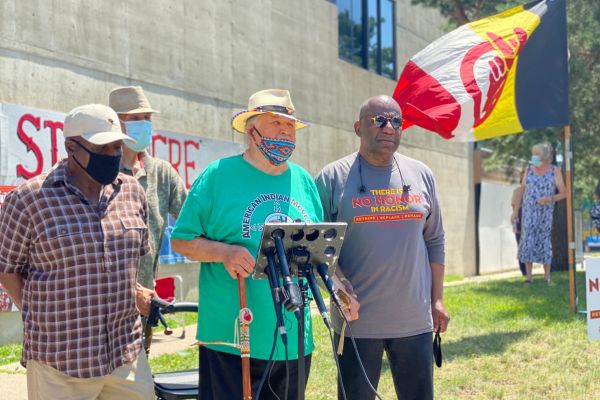
- Details
- By Darren Thompson
“The name ‘Redsk*ns’ carries deep cultural, historical, and emotional significance, honoring the bravery, resilience, and warrior spirit associated with Native American culture,” the Change.org petition says. “It was never intended as a derogatory or offensive term but as a symbol of respect and admiration. Changing the name abruptly disregards the positive legacy that the Redsk*ns name has built over the years and disorients the passionate fans who have invested their emotions, time, and unwavering support in the team.”
Washington Commanders’ President Jason Writer set the record straight, saying that the old team name would not be considered. Washington changed its former Redsk*ns team name in July 2020, after 87 years and years of refusal by the team’s former owner, Dan Snyder to change the name. In 2013, Snyder commented in an interview with USA Today that he would never change the team’s name.
After the name change in 2020, the Washington franchise took the name Commanders in 2022 after two years as the Washington Football Team. Snyder sold the franchise for a little more than $6 billion—a record amount for North American sports—in July 2023 to a group of business franchise owners, including National Basketball Association Hall of Famer Magic Johnson.
In July, the NFL fined Snyder $60 million after an independent investigation found he sexually harassed a team employee and that the organization withheld revenue from the NFL. The investigation was sparked after a House Oversight Committee received allegations of workplace misconduct by an employee named Tiffani Johnson in 2021.
Leaders and organizations have spoken out about the effort to revitalize the team name, including the National Congress of American Indians (NCAI), Illuminative, and other local leaders in the Washington-Maryland-Virginia area.
NCAI Executive Director Larry Wright (Ponca) said in a press release that he hopes that the new Washington leadership continues dialogue with duly elected tribal leaders and to engage with communities directly affected by the previous mascot. “This call to action extends to other professional franchises, including the Atlanta Braves, Chicago Blackhawks, and Kansas City Chiefs,” he said in a press release on August 30.
Illuminative Executive Director Crystal Echohawk (Pawnee) said in a statement challenging Washington Commander leadership to acknowledge why the previous name was removed.
“This conversation will not end until team leadership publicly acknowledges WHY they rebranded and the harm they caused Native peoples,” Echohawk said.
Illuminative is a Native woman-led racial and social justice organization building power for Native people by amplifying Native voices, stories and issues has campaigned for the removal of Native-themed mascots and sports.
“The Washington Commanders’ President Jason Wright announced that the team is not considering a return to their former team name, ‘period,’” said Echohawk in a statement on August 31. “While it’s great that the team is not reverting back to their old name — which, to be clear, is a dictionary-defined racial slur — this conversation will not end until team leadership publicly acknowledges the harm inflicted upon the Native community as the explicit reason for this decision.
For decades, Native leaders and allies have called on the state of Washington and the NFL to change their team name and to acknowledge the pain it has caused to the Native community. Financial campaigns, lawsuits, demonstrations, resolutions, and letters have all pressured Washington to change its name, calling the team name a racial slur, as defined in the dictionary.
Previous owners of the team, as well as the current team owners, have not apologized for the use of the name.
“Our hope is that once Commanders’ fans and the sports community at large understand this rationale, they will stop saying the former name once and for all and build a space for Native people to feel respected and safe,” Echohawk said.
“NCAI urges these organizations to follow the lead of the Washington Commanders and Cleveland Guardians, promoting a dialogue that upholds tribal sovereignty, amplifies contemporary Native voices, and paves the way for the retirement of harmful mascots, imagery, and branding,” NCAI Executive Director Wright said.
More Stories Like This
Native News Weekly (August 25, 2024): D.C. BriefsNavajo Nation Mourns the Passing of Former Vice President Rex Lee Jim
Deb Haaland Earns Endorsement From Communications Workers of America Local 7076
University Soccer Standout Leads by Example
Two Native Americans Named to Democratic Congressional Campaign Committee's“Red to Blue” Program
Help us defend tribal sovereignty.
At Native News Online, our mission is rooted in telling the stories that strengthen sovereignty and uplift Indigenous voices — not just at year’s end, but every single day.
Because of your generosity last year, we were able to keep our reporters on the ground in tribal communities, at national gatherings and in the halls of Congress — covering the issues that matter most to Indian Country: sovereignty, culture, education, health and economic opportunity.
That support sustained us through a tough year in 2025. Now, as we look to the year ahead, we need your help right now to ensure warrior journalism remains strong — reporting that defends tribal sovereignty, amplifies Native truth, and holds power accountable.
 The stakes couldn't be higher. Your support keeps Native voices heard, Native stories told and Native sovereignty defended.
The stakes couldn't be higher. Your support keeps Native voices heard, Native stories told and Native sovereignty defended.
Stand with Warrior Journalism today.
Levi Rickert (Potawatomi), Editor & Publisher

